Full Moon Wo Sagashite: Themes of Life, Death, and Love
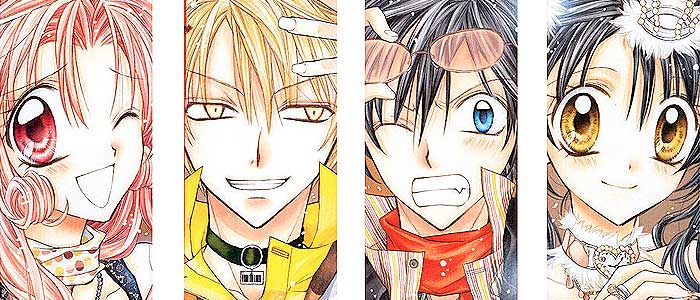
Full Moon wo Sagashite, or “Searching for the full Moon,” is an anime brimming with symbolism, music, and emotions. Inspired by the manga created by Arina Tanemura in 2002, the story of Full Moon wo Sagashite on the surface appears to be a girly story of an adolescent girl who dreams to become a pop-singer. However, the story digs much deeper than what is first shown on the surface and opens topics of struggle, what it means to live, and what it means to love. Despite the pretty colours and cute appearing characters, in many ways Full Moon wo Sagashite is an anime that allows the viewers to dig into challenging topics such as sickness, life, death, loss, and love. Ultimately, through a loss, struggle, and tragedy, the characters find what it means to live and to love. Ultimately, the anime leaves the audience pondering what it means to live, love, and sparks deep reflection and introspection into oneself.
Themes of Death and Life
“Before I knew it, someone was always getting hurt because of me. I hated myself…I was such a weakling…I’m not afraid to die. I’m afraid of living. So afraid.” —Full Moon wo Sagashite
In the very first episode, the audience is introduced to death when the main character, Mitsuki Koyama, is introduced. Mitsuki is an innocent 12-year old orphan girl who dreams to become a singer. However, she is held back by throat cancer which prohibits her from singing loudly. Furthermore, her grandmother, whom she lives with, forbids music and insists that Mitsuki forgets about singing. To complicate matters more, Mitsuki is visited by two Shinigami, or “angels of death,” who warn her that she has only one year to live. Despite this, Mitsuki insists that she is not afraid of dying, but is afraid of not getting the chance to sing. In fact, she is ready to give up her life, because she can not imagine a life without singing. Seeing her passion for singing and music, Takuto, a half-Shinigami with cat ears and tail, agrees to help Mitsuki fulfil her singing dream until her time on earth is up. Meroko, Takuto’s Shinigami partner, reluctantly agrees to help Takuto, because Mitsuki can not have any ties to the world before she dies, and singing is clearly one of her ties. From the start, the plot seems morbid and already full of death. Yet the Shinigami characters, depicted as having adorable features and human emotions, contrast against the morbid plot. Mitsuki is the only human that can see the Shinigami and it is explained that she can see these “angels of death” because she is “not living” and is searching for life beyond what she already has. Other people around her see Takuto and Meroko as a cat and bunny stuffed animals. At this point, Mitsuki is only holding onto life for the sake of music and singing. Takuto uses his powers to transform Mitsuki into a healthy 16 year old who becomes Full Moon, a blooming new pop singer. Will singing as Full Moon give Mitsuki life? Will it save her fate of dying in a year?

While able to sing as Full Moon, Mitsuki is full of hope, determination, and life. While becoming a singer, Mitsuki faces challenges such as a nasty rival, over-obsessive fans, trying to hide her true self, nasty gossips, and experiences the pressures of becoming a popular figure. However, along the way she also learns to make friends, be honest, and inspires fans both young and old. However, her true goal is not to become famous. She dreams to sing in order to reach her childhood sweetheart Eichi, a dear friend who inspired her to sing and loved her before she was adopted by her grandmother. Every song she sings, every breath she breathes, is in hope of seeing Eichi once more and expressing her true feelings to him. At the orphanage, Eichi dreamed of becoming an astronomer and taught Mitsuki to love the stars and moon as well as inspiring her to fulfill her singing dream. Mitsuki was suddenly separated from him when he got adopted by a family in America. Since then, her life seems to be for Eichi. Takuto notices this and is irritated; first by feelings of jealousy and second by the question of why can’t Mitsuki sing for herself rather than for Eichi.

42 episodes later, after hard work and perseverance, Full Moon gains popularity and success, but Mitsuki still doesn’t hear from her beloved Eichi. Winning a competitive singing competition as Full Moon, Mitsuki finally flies to America for the very first time to find Eichi–only to find out that he died tragically in a car accident shortly after he arrived in America. The loss and tragedy hits Mitsuki so hard that she no longer has the desire to sing or to live. Mitsuki becomes increasingly more ill and lacks motivation to live: she stops singing, talking, eating, and artistically is drawn with clouded eyes. Suddenly, the once lively, determined, and hopeful Mitsuki becomes clouded by her loss and grief. Her lack of motivation stops her from transforming into Full Moon. She spends more time in the hospital because of her weakened state. At this point, Mitsuki becomes easy bait for Izumi, a sadistic Shinigami, who is a rival to Meroko and Takuto. He is the ultimate symbol of death. Izumi lacks the ability for true love, because when he was alive, he never knew true love. He is partners with a ghost-like Shinigami named Jonathan, who speaks in a monotone voice and is incredibly flat and emotionless. Their goal is to drag others into their unceasing misery.

Izumi visits Mitsuki to persuade her to commit suicide. Izumi convinces Mitsuki that her parents and Eichi are waiting for her and that she is not doing anything wrong by wanting to go to them. He grabs her by the hand while she is lying in the hospital bed and brings her to the top of the hospital building. At this point, Mitsuki is ready to give up life. Although Mitsuki is initially saved by her grandmother, who catches her from falling off the ledge of the building, Mitsuki’s spirit is saved by love and by hearing the story of another character who faced the same feelings and regretted not living—Takuto. Takuto, while getting to know Mitsuki and helping her fulfil her dream as a singer, gets flashbacks of his life while he was a human. He was a music lover and musician who used to sing in the band Route L, a band that Mitsuki’s father sang in as well. In many ways Takuto was like Mitsuki. He was full of life and spirit until he too developed a tumour in his throat, which ruined his voice and embarrassed him while he sang in a public concert. Frustrated, humiliated, and giving up all hope, he tragically attempted suicide. The punishment for souls who commit or attempt suicide in this anime is to become a Shinigami in the afterlife. Shinigami are subject to a life of eternal emptiness and regret and because they once ended their own life prematurely, they are fated to take human souls. Although a rather morbid mythology and thought, the idea of the eternal torture from regret and termination of life is interestingly translated in the sufferings a Shinigami must face. Takuto regrets the way he ended his life, and he will do anything to stop Mitsuki from ending hers. His role switches from being a Shinigami who is supposed to take Mitsuki’s life to the force that restores life and returns meaning and purpose to Mitsuki’s life. Shinigami are not supposed to remember their human memories and punishment for remembering their past is to become a ghost. However, Takuto, determined to give Mitsuki a better life, uses his memories to convince Mitsuki that she is too valuable to destroy her life. Life is no longer about loving music or loving just one person, life suddenly becomes about loving yourself too.

The pun of “L.I.V.E” as in singing live and to live is used. Takuto explains to Mitsuki that singing is life and that loss in life should not mean life is over. In this moment, Mitsuki is reminded of all those who helped her to become Full Moon and the love of the people around her: her friends, her grandmother who saved her, her mother and father who are watching her from above, her doctor, her singing director, Takuto, Meroko and even Eichi who passed on. Suddenly life is shifted from small lenses of just fulfilling a dream to become living loved.
“You are alive right? Then you will continue to love. That’s what it means to live.” —Meroko
Development and Growth of Love: Sacrifice
“Why? I’ve completely forgotten how to love
meetings will come someday with the beginning of parting
Somehow, I have decided upon that ideaYou tied my loose shoe laces of my dirty sneakers
Your shy smile suddenly shone in the sunlightIt’s not that I love for want of love
You gave me the courage to love straight-forward” — Translated Lyrics of Love Chronicle
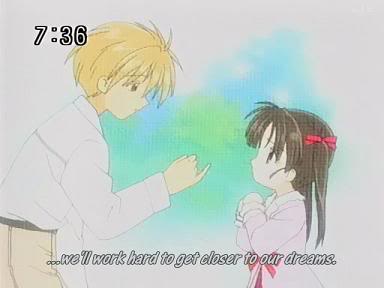
Full Moon wo Sagashite is full of romance and love. As a Shojo magna, one of the main goals of the plot is to communicate a romantic narrative. However, love is developed in many ways and it is not the typical romance that one would expect. Although not a coming of age anime, in many ways Mitsuki and other characters in this anime grow and mature in loving. They learn what true love is: sacrifice, hard work, and dedication. As the anime unfolds, the audiences see a shift from superficial love themes to the development of true love.
Mitsuki, as a child did not receive proper love from her family as her mom died in childbirth and her father died shortly after in an accident. So, when she is treated kindly by a young boy at the orphanage, Mitsuki clings to him. This young boy is Eichi– a boy who treated Mitsuki as a younger sister. He believed in her and saw her potential to sing at such a young age. Because of this, Mitsuki clung onto him and became very close to him. However, because of her immaturity, she had difficulty expressing her true feelings and when she heard he was moving to America, she withdrew and hid, denying the separation. Years later, she regretted this and poured her heart into songs as Full Moon to reach him. Mitsuki is so “in love” with him, she lives in hope to see him again. This, of course is over passionate and unreasonable, and Mitsuki realizes that it isn’t healthy to cling on to people in obsessive way and that love can still exist even after death. Mitsuki recognizes that Eichi will always be in her heart and he would want the best for her. This is shown in the lyrics to her songs she sings after she finds of his death. For example, she sings the song Smile, Smile expressing her love, but this time acknowledging that Eichi is watching her from above:
“Smile, smile
watch me always, watch me forever whenever
Smile, smile
want to believe, want to feel it forever
Smile, smile
being able to understand happy mornings and sad nights
I won’t forget to smile.” Translated Lyrics of Smile, Smile
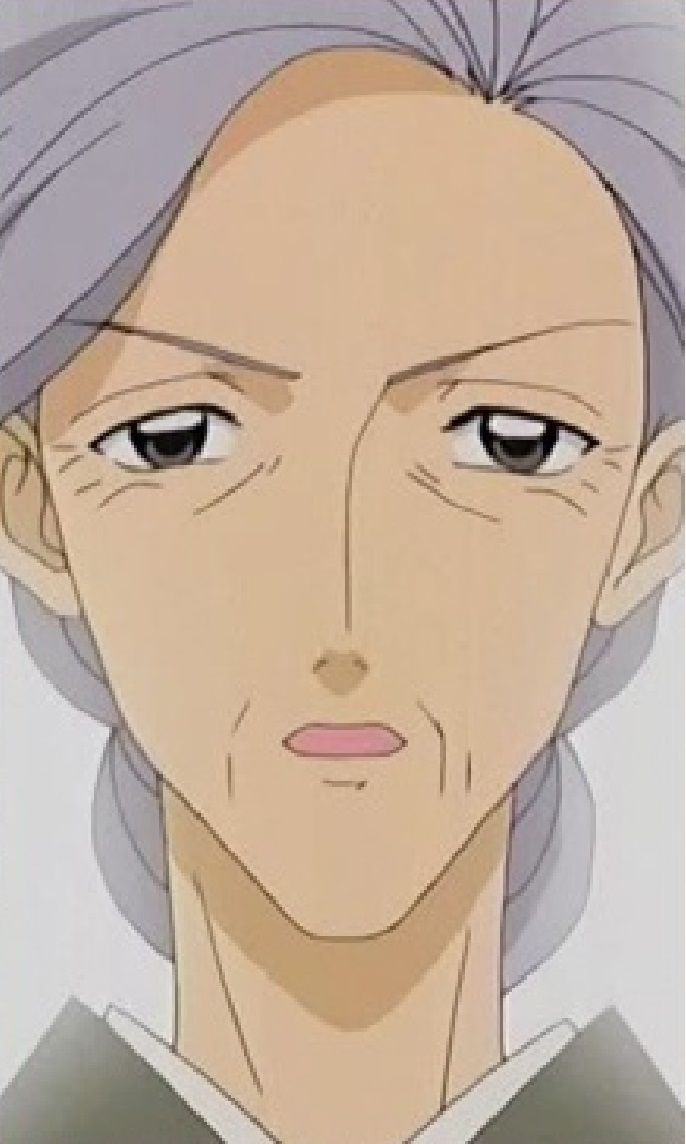
Another character whose ability to love is transformed in the anime is Mitsuki’s grandmother. A hardened, tough, and highly strict woman, Mitsuki’s grandmother is so hurt that she has forgotten to love. Mitsuki’s grandmother, Fuzuki, believes love is to be over protective. Fuzuki, although loving her daughter, disapproved her daughter’s choice for a husband, causing her own daughter to run away from her. Furthermore, after her own daughter died, she is overly cautious about Mitsuki’s health, forbidding her to do many activities. There is no denying that Fuzuki loves her daughter and granddaughter, but she is unable to allow her love for them to show or develop. In the anime, she is depicted as rigid, strict, harsh, and difficult to connect to. Love is not reaching Fuzuki at all and she is unable to show love to her granddaughter, Mitsuki. However, when Fuzuki sees her granddaughter about to fall off the ledge of the hospital, she expresses that she loves Mitsuki and does not want to see her die. When Fuzuki saves Mitsuki, she shows sacrifice and love that up until this point in the plot she was unable to express. In fact, Fuzuki destroyed Mitsuki’s dreams by forbidding her to sing, or think of music, and never allowing her to do anything without strict surveillance. Fuzuki realizes her mistake: to love one must allow others to make their own choices, decisions and mistakes. Free will must be respected. Because Fuzuki didn’t respect her daughters choice of a partner, she ran from her. Because she did not respect Mitsuki’d desire to sing, Mistuki started to sing behind her back. Fuzuki realizes she must respect her granddaughter’s thoughts, ideas, and dreams and is softened. She is able to support and freely express her love later in the anime. She desires to hear Mitsuki sing and swears to give Mitsuki the best life.

Perhaps the biggest symbols of love are Meroko and Takuto, the two Shinigami who sacrificed everything to make sure Mitsuki lives. One of the biggest character transformations is that of Meroko. At first, Meroko is shown as a comical character who is often silly, childish, jealous, obsessive, over-dramatic and demanding. She seeks love and dotes on Takuto throughout the anime, hoping to have her feelings heard and returned. However, to her dismay, Takuto does not reciprocate the feelings Meroko has for him. Initially, Meroko was paired to work with Izumi, but Izumi, an ill-mannered and emotionless person, dissolved their team and broke Meroko’s heart. Since then, Meroko has been seeking someone to love her, thinking love is kisses, hugs, and empty words.
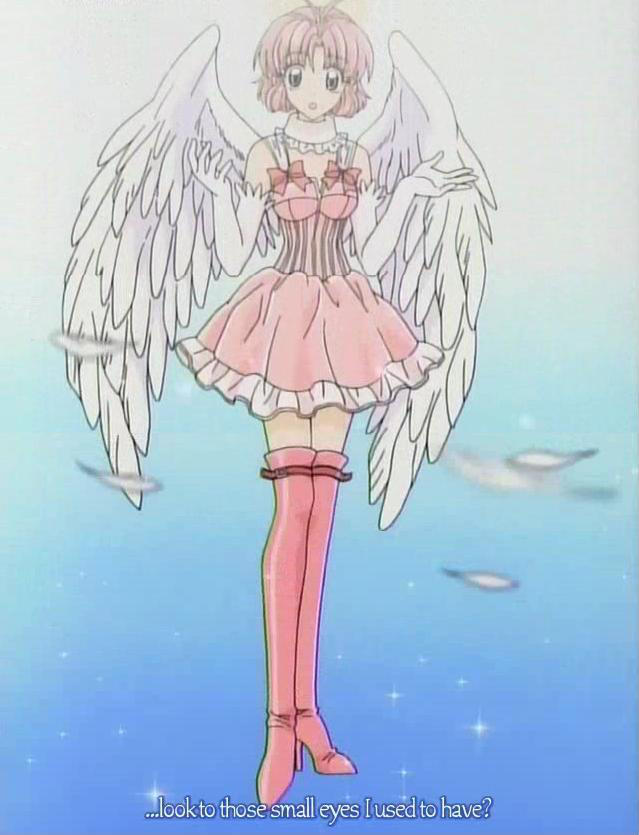
Meroko, although crushes on Takuto, realizes that Takuto isn’t interested in her in that way. However, Meroko learns there is a different kind of love–one of sacrifice, caring, and forgiving. Meroko and Takuto, while trying to help Mitsuki, get into fights, quarrel over small things, and sometimes have difficulty having empathy for each other. However, as the journey continues, the two learn to forgive each other, and sacrifice for each other. When Izumi comes to tempt and tease Meroko, she stands strong against him and tells him that she no longer wants his type of superficial love. Meroko explains that witnessing the sacrifices Takuto made to help Mistuki live and fulfill her dream taught her what love is really about: sacrifice. Izumi is left confused and baffled, but realizes that Meroko is no longer weak enough to be his toy. Meroko works hard to create a special gift for Takuto, she works hard to prevent him from becoming a ghost, and helps Takuto save Mitsuki. When Takuto uses his memories to help Mitsuki, Meroko is saddened because she knows his fate will be to turn into a ghost. Saddened and determined to save him, she goes through the torture of retrieving the flower of forgetfulness, a flower that can prevent him from turning into a ghost, for him. When Takuto’s power as a Shinigami is weakened and he has difficulty transforming Mitsuki into Full Moon, Meroko cuts off her hair and gives to Takuto in order to restore his power. In the end, it is Meroko who protects both Mitsuki and Takuto and she is rewarded by becoming an angel for learning to truly love.

Perhaps the ultimate love that is demonstrated is the sacrifice that Takuto Kira goes through to restore hope, life, and music in Mitsuki. At the start of the anime, Takuto plays a protector figure that guides Mitsuki, protects her as Full Moon, and continuously pushes her to fulfill her dream. However, Takuto is a challenging tsundere personality that appears cold and rough and tends to be sarcastic and mean to hide his true feelings. Tsundere is a Japanese term that is used to define a character who develops from being very cold and dry to loving and friendly over time. Being with Mitsuki brings out Takuto’s turbulent, stubborn side, but also brings out his tender and loving side. Takuto sacrifices for Mitsuki many times to the point, Mitsuki asks him why do you do this for me? Takuto, unable to express his true feelings, covers it by saying because Mitsuki is an immature girl who keeps getting into trouble. In reality, Mitsuki unlocked Takuto’s past and mistakes and working with her not only restored love in his heart, but also allowed him to love himself once more. After Takuto uses his memories of his past to restore confidence and life in Mitsuki, he knows he will end up becoming a ghost because he defiled the rules and roles of a Shiniagmi. Mitsuki seeing this, is saddened and is determined to prevent Takuto from becoming a ghost. Without Takuto, Mitsuki would never sing, or have a chance to live. Takuto restored life in Mitsuki and Mitsuki, along with Meroko, is determined to restore life in Takuto. The only way to restore Takuto and prevent him from becoming a ghost is to erase all his memories. This would mean he would forget his mistakes, his old life, Mitsuki, and Meroko, but would give him a fresh new chance. At first, Takuto refuses, saying just seeing Mitsuki live and sing is enough for him. However, Mitsuki refuses saying Full Moon only exists because both of them want to live. She argues it is not enough that her life and spirit is restored and claims she wants him by her side always. In this moment, Takuto is touched by her love, and takes the flower of forgetfulness. Tears of sadness and joy fall down on Mitsuki’s face as she knows Takuto will be saved, but will no longer remember who she is after her final performance. Before Mitsuki’s final performance as Full Moon is over, Takuto begins to forget who he is and he is taken up to the underworld where he meets Mystere (a character like God). Mystere, seeing Takuto’s sacrifice and willpower to save Mitsuki, gives Takuto a second chance on Earth and is restored as a human once more.
From Death to Life: New Future
The ending leaves a bitter sweet sting in the hearts of the audience. Mitsuki takes the surgery and it is successful in removing the cancer without destroying her vocal chords. She lives past her 13th birthday, because Takuto and Meroko changed her fate. Meroko becomes an angel and Takuto, although no longer remembering who Mitsuki is, is able to redeem himself and live again. Meroko, Takuto, and Mitsuki are no longer together as they once were and Full Moon is no longer needed. Ultimately Takuto and Mitsuki gave each other life. Mitsuki through her passion, love, and terminal illness allows Takuto to recall his past mistakes and retrieves his ability to love again and ultimately through Mitsuki’s love he is given the chance to live again. Similarly, Takuto through his love, inspiration, and sacrifice of his own fate and memories, gives Mitsuki the chance to sing and restore her willpower to live. Mistuki is no longer able to see Shiniagmi because she has finally started to live. Mitsuki, heart-broken and missing her Shiniagmi friends, is visited by angel Meroko wishing her luck and sees Takuto, who is a human without memories of his past, but ready to make a new future. Both Mitsuki and Takuto are ready to begin a new future–what this future will be is left for the audience to ponder and imagine. But once more, the song New Future, which is the opening of Mitsuki’s journey with Takuto and Meroko and as Full Moon is played:
“Just one thing doesn’t change
That dream I painted
How did I appear as I am now
In my young eyes back then
Hey, look up at it, it’s such a vast night sky
So that soon, so that you understand
You will shine at your best soon so hurry
Look for the FULL MOONLet’s sing a song!
Together forever Everything I can do for you right now
Day by day
Your destiny until now From tomorrow, clutch your hopes to your chest
Let’s sing a song!
Together forever If I’m with you I can overcome any hardship
More and more
More and more and more I want to be closer Please stay right here
many thanks for you!Wonderous chance meetings
As long as they keep happening
We have ever more precious things
All those days full of chance mischief
Now I can laugh and love them
That’s right, I always yearned for the wide stage
Now I’m no longer alone
Everyone is full of smiles
Because this is where I amLet’s sing a song
Tonight, rather than the spotlight, it’s me that will shine now
Day by day
Those passionate looks and cheers shine upon my streaming sweat
Let’s sing a song
Tonight I want to believe there are never ending burning thoughts
More and more
More and more and more I want to scream this song, this dream will
never endLet’s sing a song!
Repeat and repeat
Let’s sing a song!
Repeat and repeatThis is the song for you”
Indeed, this song is for the audiences to remember what life is all about: love, sacrifice, dreams, and music.
What do you think? Leave a comment.










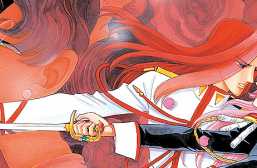

I read the manga years ago as a kid and really enjoyed it, but I didn’t know there was an anime until recently. I was so drawn in that watched the entire thing in a few days! Mixing such beautiful and fun moments with bitter ones is really what got me the most.
I absolutely loved this anime. At first I thought it was really childish, but my friends ASSURED me it was worth watching… so I endured the more boring parts and kept watching… and it was totally worth it. It has become my favourite one. You’ll want to re-watch it many times, even if it does have 52 episodes. I’ve watched the whole thing 3 times, in 6 months. Now that I have read your amazing article on it, I am about to start another rewatch!
This show was hard for me to get through, since I’m not a romance fan too much. But the twists and turns this took were totally unexpected, and took me for a depressing ride that… I’m not sure quite how it ended out. I definitely don’t regret watching this, but it somehow isn’t my taste either. I guess I’m just too picky?
Great article. I feel this anime seems like one of those animes for a little girl. However, this is one among a handful of anime wherein there is more than what meets the eye.
Yes, for sure!
Personally, it was a little too bubbly and scattered for me to enjoy fully, story wise. The characters never felt real enough to me for me to empathize with their backstories, even though they were all unique. It could just be that I was never really settled enough in the pacing to be able to digest them. But the art is beautiful, and it’s good as reference material into classic shoujo. Technically, the art is well done.
Ya, I can see this! The art is great and well as the music
The pacing is probably the biggest issue. I think without the anime breathing down Tanemura’s neck, the backstories could have been even stronger.
But between Mitsuki and Fullmoon, they can wear just about anything, and Takuto and the gang are adorable. It’s so much fun to look at!
If you like music and singing guys you should definitely watch Uta no Prince-sama!!
Great analysis! This was one of the first manga titles I owned when I was becoming a fan in high school. Just throw on my MP3 player, put on the romantic jams, and my shojo smut. Great throwback!
It’s hard to believe how many years it’s been since this first came out!
I feel like this one is definitely one of the must-haves of any shoujo collection. It’s a total classic that helped move forward an era of shoujo. Doesn’t matter if it’s good or not xD The art and the story is really an emptome of 90’s shoujo! I’m glad to see an in-depth analysis of this.
If u think this anime is sad watch Asura 2012, Zetman, Kino’s Journey, Yu-gi-oh Gx! (till the ending), & read Drifting Classroom, Vaniante, and Parasyte and u will see what i mean. IT SO SAD!!
that whole anime made me cry i never had anime that can make cry and i watched it twice, a year after it came out and just a week ago omg it was total epic the plot and tradgity in it makes me cry but the end gets me the most,
This anime introduced me to Scanty, the OP song is so good. It’s a constant ear worm for me. haha
This anime is sad when you think about the characters situation. Everything is good then it suddenly changes because of the situation the character is in. It got me thinking what would i do in a situation like this. It is one that makes you want to reach for your dreams as well.
I watched this show after a large number of female acquaintances recommended it. Being a guy, I didn’t expect much from this childish sounding anime (especially after Fruits Basket) but it definitely surprised me, and then some. This anime is a lot deeper than it initially appears and the message it gives is a very positive and uplifting one.
I think I prefer the anime over the manga for how naturally the anime flows. I think both endings and versions are good, but the anime pulled my heartstrings more and the ending felt more complete. I do wish there was more exploration of different characters in the anime like there was in the manga, but it was still a really fun ride!
Nice piece. For me personally, the story of full moon wo sagashite will always remain in my heart because it was just so beautifully and masterfully written. In the end, I think that it really did end up being something special.
Thank you! I totally agree 🙂
The characters are very well developed and you grow to love them in a unique way. Takuto a personal favourite.
This was the second anime I watched after Sailor Moon back in grade 10 and loved it. Near the end, I got addicted and would watch six episodes a night. It is an amazing anime.
This will defientely always be one of my favorite animes of all time. There is so much depth to be enjoyed with this anime, it’s impossible not to love it!
This is classic shoujo though, like literally made for preteens so you need to have a right frame of mind for it. That being said, this show is really good. I saw a good chunk of it, but I never finished it. At the time, the big eyed design bothered me, but I would love to see it again.
You should try the manga then. It was really good. It probably made me cried 50% more.
If you like the anime, you should read the manga! I found it hard to get with the anime because they had changed so many things that I already loved about the manga. I love this story, but I believe the manga does it better justice. My favorite character, Izumi, had his whole backstory cut out and personality shifted for the anime, which was one of the things I didn’t like about it. I do love Full Moon though, and the characters and messages it conveys.
Shows us the importance of wanting to hang on to what we hold dear in life, to regain what has been lost and hold on to it no matter the price.
It’s an anime that won’t be outdated.
I will never forget watching Full Moon wo Sagashite. It is certainly an experience, especially for the last fifteen or so episodes. One thing that really struck me was the ending. I’ve never come across an anime with such a perfect ending. Everything was tied up, and the emotions that came across were just… mind-blowing. I think I actually sobbed the entire last episode.
The first time I watched this anime, one simple thing happened. It stole my heart.
When I first heard about this anime, I wasn’t that impressed. I thought it was just another shoujo anime about a little girl getting to fulfill her dream with the magic help of some Shinigami. I can honestly say that I was wrong, now that I’ve watched it all. This anime is suprisingly emotional and I can’t describe how much I cried in the end, even though everything worked out just fine.
full moon wo sagashite was one of my most loved animes. i was looking at animes that i could watch and i found my self looking at the title i really liked the sound of it also i like the moon and stars so i was interested.
Full Moon wo Sagashite was my first real anime. It has a special place in my heart and always will and I love it so very, very much. I literally had moments where I would watch the anime with earbuds on, pause, take the earbuds out, and realize I was in a puddle of my own tears. It’s a beautiful, sad story and I really wish for more.
Because of you I decided to watch this anime and I just finished it last night. It was such a good and sad anime. I am so sad it is over 🙁 but I am going to read the manga next 🙂 Thank you so much for introducing me to this anime!
Wow thats awesome you decided to check it out 🙂
I’ve read the manga and was a great read. Very powerful In the meaning living life to the fullest.
The anime is very different from the manga, but it’s still faithful.
There’s nothing wrong with living each day like it’s the last!
Love this anime. I would classify it as a fantasy musical.
The plot of this anime was unlike any plot I have seen before!
This anime is now one of my favourite anime! The plot is fantastic, the best that i have come across so far!
I love the plot twists! Thanks for reading 🙂
Ah, I remember reading the manga way back! I liked it a lot and it was kind of the start of my interest into Arina Tanemura’s other works. To be honest, I never watched the anime, but I loved the songs and saw scenes from the last few episodes online, haha. I did like this article though, because a lot of the themes you wrote about were present in the story. It’s been a long time since I’ve read it but I do remember there being differences between the anime and the manga, and from the article I can see what some of them are. That doesn’t change that a lot of the core themes are still the same however. I liked the way you broke it up by characters and their roles in the story as well. Guess its time for me to reread this one! 🙂
This was one anime I watched with my friends religiously as a child. Though I didn’t feel as many feels as I do now. Loved all the soundtrack too.
For everyone who loves the series, I encourage you to check out my blog dedicated to it. 🙂
https://fullmooniseternal.tumblr.com/
[SPOILERS]
I adore this anime, both the manga and anime are very powerful and both endings beautiful. The anime fleshes Mitsuki’s career out more and makes Mitsuki’s friendship with Meroko more heartwarming—Meroko and Takuto are equally important. Angel Meroko kissing Mitsuki’s cheek and wishing her good luck always makes me cry. She couldn’t see her, but she felt it.
Meroko’s trials acquiring the Flower of Forgetfulness are so dramatic and exciting, but also quite moving.
The manga has some darker moments and touches on some sordid sides of the idol industry poor Ooshige-san tries to hide Mitsuki from. As a kid, I thought Ooshige being drunk so often was funny, now, I find it quite sad. She’s a depressed alcoholic who fell short of ideals… but she finds happiness too, that was always quite moving.
Izumi suffered so much that his current inability to trust others or let them close makes sense, while he makes a great villain in the anime, I wish we saw his sad past that explains why he is the way he is, why he uses those childish nicknames (Izumi’s mentally much younger than he looks, half in a state of arrested development…) and that he’d be saved too. He has one act of kindness for Meroko’s sake that hints well, but he’s still trapped in his depressed state…
Beautiful story with uplifting messages, the author wanted so badly to encourage people to live with all their might.